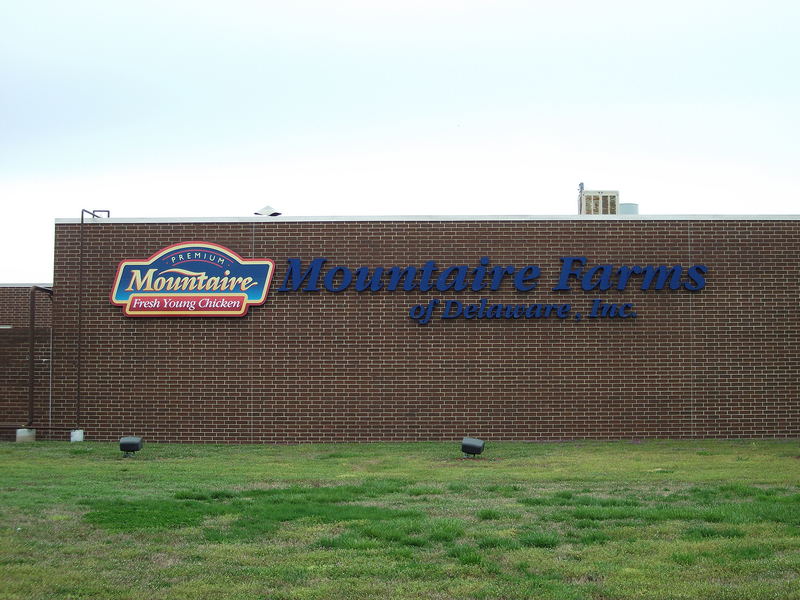Mountaire Farms officials say neighbors of the company’s Millsboro poultry plant are interested in getting deeper wells following a state violation notice to the plant for contaminating groundwater.
“Right now we're in the gathering information phase to see who is interested in having deep wells,” said Sean McKeon, director of communications for Mountaire.
McKeon said he and several other Mountaire employees have gone door-to-door this week handing out letters to residents explaining the process for deepening their wells.
Mountaire officials are targeting 88 homes, some with high levels of nitrates in their drinking water. In November, Delaware Department of Natural Resources and Environmental Control cited Mountaire for exceeding nitrogen limits when spraying. Besides high levels of nitrates, in August, bacteria found in the sprayed wastewater was measured at more than 5,000 times the permitted level. One sample found fecal coliform exceeded 1 million colonies per 100 milliliters.
The November notification marked the second time this year DNREC cited Mountaire because of high levels of nitrates.
Biological oxygen demand limits were violated on 29 separate days between April 2015 and October 2017. The permit limit is 50 milligrams per liter; the most extreme violation was recorded Sept. 22 at 1,210 milligrams per liter.
Total suspended solids limits were violated 24 times between May 2016 and October 2017. The permit limit is 50 milligrams per liter; the most extreme violation was recorded Sept. 26 at 4,220 milligrams per liter.
Fecal coliform limits were violated nine times between April 2017 and late September 2017. The permit limit is 200 colonies per 100 milliliters of water; the most extreme violation was recorded Aug. 31 at 1.1 million colonies.
Total chlorine residual limits were violated 16 times in September 2017. The permit limit is 1-4 milligrams per liter; all violations were below that range, with the lowest recorded Sept. 6 at 0.03 milligrams per liter.
Total nitrogen limits were violated 30 times in 2017. The permit limit is 15.6 milligrams per liter; the most extreme violation was recorded Sept. 26 at 641 milligrams per liter.
The cumulative effect of the nitrogen-related violations has led Mountaire to exceed its annual allowance of 320 pounds per year on all but two of 13 spray fields used to dispose of wastewater from the poultry plant. One field has accumulated more than 1,000 pounds of nitrogen so far this year.
McKeon said personnel issues led to the inflated nitrogen levels, and certain employees were immediately dismissed.
“They no longer work here,” he said.
But Maria Payan, an organizer with the Socially Responsible Agriculture Project, says stronger penalties are needed. “I'd like to see criminal charges. There was someone at the top who was approving this,” she said.
Solid waste released onto land in August is potentially toxic material, she said.
Payan said she has talked to many neighbors who are worried about health consequences from living near the plant. Some have had miscarriages, seizures and asthma attacks.
“People are asking if this has to do with the operation,” Payan said. “They are scared.”
Following the August incident, McKeon said, the plant fixed immediate problems to improve the system, including removing solids and adding more oxygen to the wastewater treatment system.
McKeon said Mountaire is working with DNREC; he said the company was not ordered to drill deeper wells for residents. “We work very closely with DNREC and send them daily reports,” he said.
DNREC spokesman Michael Globetti said DNREC continues to engage Mountaire on wastewater issues in the area of the Millsboro plant.
“The majority of homes tested under the limit, but if they want water, we'll give them water. If they want deeper wells, we'll give them that,” McKeon said.
McKeon said Mountaire has worked to improve nitrogen levels since it bought the site in 2000. At the time, he said, eight nearby homes were identified by the U.S. Environmental Protection Agency in a correction plan, and Mountaire has been providing those homes with water and, in one case, a water-filtration system.
“This is something we've done in the past … we thought this was the right thing to do to provide water for people,” McKeon said.
Most of the 88 homes have accepted bottled water from Mountaire; only a few refused, he said.
Mountaire is considering providing water to residents through a source other than private wells, but McKeon would not say what water companies have been contacted. “We're just in the early phases of discussion,” he said.
New wastewater treatment design
Mountaire is in the process of completely redesigning its wastewater treatment facility. An engineer who designs wastewater treatment systems for poultry plants is designing the system for the Millsboro facility, McKeon said.
Once the design is complete, the company must receive approval and permits before the system can operate – a process that may take up to two years, McKeon said.
Melissa Steele is a staff writer covering the state Legislature, government and police. Her newspaper career spans more than 30 years and includes working for the Delaware State News, Burlington County Times, The News Journal, Dover Post and Milford Beacon before coming to the Cape Gazette in 2012. Her work has received numerous awards, most notably a Pulitzer Prize-adjudicated investigative piece, and a runner-up for the MDDC James S. Keat Freedom of Information Award.






















































